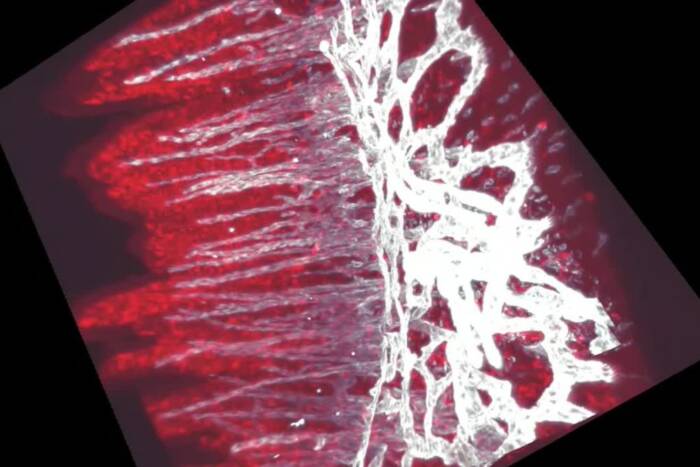Rockefeller University Scientists Receive Prestigious Awards for Cancer Research
General Motors Recognizes World’s Foremost Cancer Scientists
DETROIT — Arnold J. Levine, Ph.D., newly appointed president of The Rockefeller University, and Robert G. Roeder, Ph.D., professor and head of the Laboratory of Biochemistry and Molecular Biology, have been recognized by the General Motors Cancer Research Foundation for their major contributions to cancer research.
Dr. Levine was cited for the isolation, cloning, and characterization of the biological properties of the p53 tumor suppressor gene. He will receive the Foundation’s Charles S. Mott Prize, which honors the most outstanding recent contribution to the discovery of the cause or ultimate prevention of human cancer.
Dr. Roeder and co-winner Robert Tjian, Ph.D. of the University of California at Berkeley, were cited for their discoveries on the mechanism and regulation of gene transcription in eukaryotic cells. They will share the Alfred P. Sloan Prize, which honors the most outstanding recent basic science contributions to cancer research.
The awards will be presented during a ceremony at the U.S. Department of State in Washington, D.C. on June 9. Each prize consists of $250,000 and a gold medal.
“Breakthroughs in molecular biology are revolutionizing cancer research and laying the foundation for entirely new diagnostics and therapies,” said Dr. Samuel A. Wells, Jr., President of the GM Cancer Research Foundation (GMCRF.) He called Drs. Levine and Roeder exemplary scientists and worthy recipients of the Foundation’s awards. “The selection of awardees follows a rigorous review process conducted by a panel of prestigious international scientists,” he said.
In December 1998, Dr. Levine became head of The Rockefeller University, the nation’s first medical research institute. A member of the National Academy of Sciences, he has received many honors, including the 1998 Horwitz Prize and awards from Memorial Sloan-Kettering Cancer Center, Bristol-Myers Squibb, Eli Lilly, the University of Texas M.D. Anderson Cancer Center, and the Strang Cancer Prevention Center.
Dr. Levine is a leading authority on the molecular basis of cancer, and is perhaps best known for his discoveries about p53, one of our cells’ master genes, and one of the most important defenses against many forms of cancer.
Over the past decade, scientists have determined that p53 abnormalities are associated with more than half of all human cancers. As a result, p53 is a major focus of research in laboratories around the world.
Dr. Levine pointed out that pure scientific curiosity paved the way for his later accomplishments. “When I was a graduate student at the University of Pennsylvania in the late 1960s, I wanted to understand what caused cancer in human beings,” he said. “At that time, we knew very little, but one of the wonderful things about science is that you follow the leads and see where they can take you.”
He expects to continue along the path of trying to find drugs that affect the mutations of p53, and sees his position at Rockefeller as an ideal place to start.
“At Rockefeller, we’re engaged in cutting-edge research and graduate education of the highest quality,” he said. “And we’re right across the street from Sloan Kettering and New York Presbyterian Hospital. Together, we’ll see the applications of our research, by working with people who need our help.”
Sloan Prize recipient Dr. Roeder is an equally accomplished scientist. A member of the National Academy of Sciences, Dr. Roeder’s many awards include the American Chemical Society Eli Lilly Award in Biological Chemistry, the Outstanding Investigator Award of the National Cancer Institute and the National Academy of Sciences-U.S. Steel Award in Molecular Biology. In conjunction with Dr. Tjian, he has also received the Passano Award and the Lewis S. Rosenstiel Award for Distinguished Work in Basic Medical Sciences.
“I began my career in the early days of understanding what vertebrate genes were and how they function,” Dr. Roeder said. “I first became interested in gene activation because this process is at the center of cell growth and differentiation. As we become familiar with the fundamentals of how genes work, we get closer to understanding cancer.”
The normal growth and specialization of animal cells, and changes in these processes in various disease states such as cancer or virus infection, result from programmed changes in the patterns of gene expression. Gene expression is in turn regulated mainly at the level of transcription, the process of making “messenger” RNA copies of the DNA sequences which comprise the genes.
For the past 25 years, Dr. Roeder’s laboratory has pioneered biochemical studies of, and made fundamental discoveries regarding, transcriptional regulatory mechanisms in animal cells. This includes the discovery of the enzymes (RNA polymerases) which directly copy DNA, their associated helper factors, and the first of many hundreds or thousands of gene- and cell-specific activators that regulate their function on target genes.
Dr. Roeder explained that over the years he has become increasingly interested in the applications of his research. “We need not only to understand the mechanisms underlying normal gene expression, but to relate these to important medical problems at the same time,” he said. “There is none greater than the cancer problem.”
Cancer research is a key philanthropic priority for General Motors. As part of this commitment, the automaker established the GM Cancer Research Foundation (GMCRF) in 1978 to recognize the outstanding accomplishments of basic scientists and clinical scientists in cancer research around the world.
“We believe strongly in giving back to the community,” said John F. Smith, Jr., Chairman and CEO of General Motors. “Through these awards, we hope to bring some of the world’s most gifted scientists just that much closer to curing, treating and preventing cancer in the future.”
The awards, valued at $250,000 each, are among the most prestigious in the field of medicine. To date, GMCRF has awarded over $9 million to 83 scientists, in an effort to focus worldwide scientific and public attention on cancer research. Seven winners have subsequently won Nobel prizes.
Past laureates include E. Donnall Thomas, M.D., who developed the technique of bone marrow transplantation; J. Christopher Wagner, M.D., who discovered the link between asbestos exposure and lung cancer; and Samuel Shapiro, B.S. and Philip Strax, M.D., who demonstrated the importance of mammograms in improving survival in women with breast cancer.
In addition to Dr. Levine, Dr. Roeder and Dr. Tjian, 1999 laureates include Charles F. Kettering Prize winner Ronald Levy, M.D. of Stanford University. The Kettering Prize recognizes the most outstanding recent contributions to the diagnosis or treatment of cancer.
The four laureates will receive their awards at a ceremony that concludes GMCRF’s Annual Scientific Conference, June 8-9 at the National Institutes of Health in Bethesda, Maryland. The conference, which focuses on genetic instability and cancer, will include lectures by this year’s prize winners describing their research.


